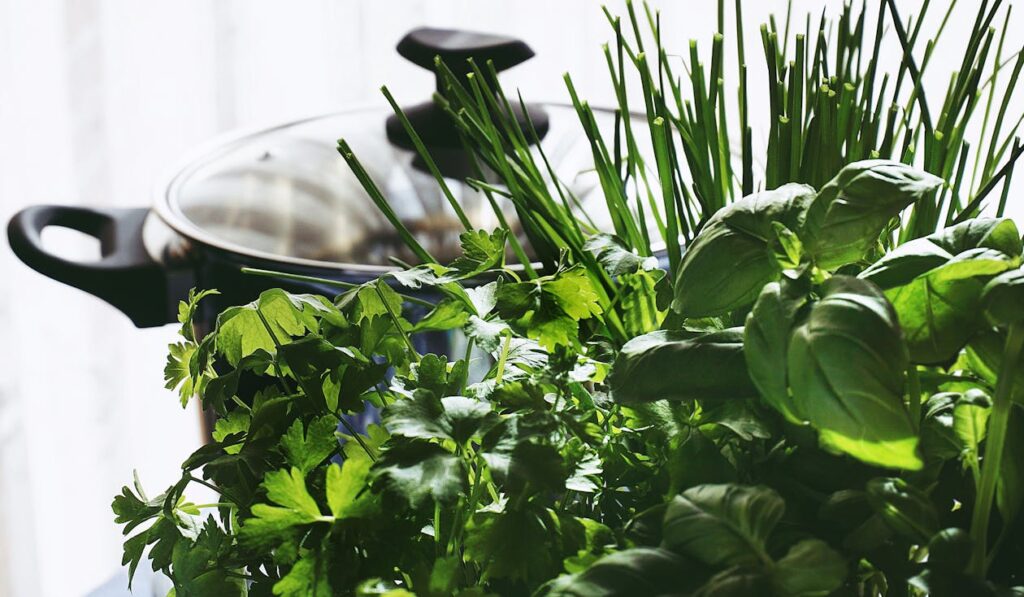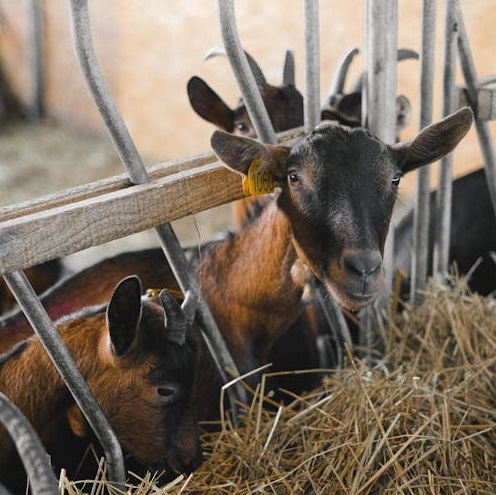Sharing fresh herbs from your garden with your goats can be a delightful way to add variety and potentially some health benefits to their diet. Parsley, with its vibrant green color and aromatic fragrance, might seem like a natural choice. But can goats actually eat parsley, and if so, is it a beneficial addition to their menu? The answer is yes, goats can enjoy parsley in moderation as part of a balanced diet. This guide will explore the potential benefits and drawbacks of feeding parsley to your goats, along with tips on responsible feeding practices and alternative food options.
The Benefits Of Feeding Parsley To Your Goats (In Moderation)
While not a dietary staple, parsley offers some potential benefits for goats when consumed in limited quantities:
- Digestive Aid: Parsley is a natural source of dietary fiber, which can aid digestion and promote a healthy gut microbiome in your goats. The fiber helps regulate their digestive system and keeps things moving smoothly.
- Vitamin and Mineral Boost: Parsley contains small amounts of essential vitamins like vitamins A, C, and K, along with minerals like potassium and iron. However, they shouldn’t be considered the sole source of these nutrients.
- Fresh Breath (Maybe): While the scientific evidence is inconclusive for goats, parsley is known for its breath-freshening properties in humans. It might just leave your goats feeling a little minty fresh after a snack!
- Appetite Stimulant: The aromatic properties of parsley can stimulate a goat’s appetite, which can be helpful if they seem a bit picky with their food.
- Natural De-Wormer (Partially): Some traditional practices suggest that parsley can be a natural de-wormer for goats. However, there’s limited scientific evidence to support this claim definitively. It’s always best to consult a veterinarian for a proper deworming regimen.
Things To Watch Out For When Feeding Parsley To Goats
Despite the potential benefits, there are some important considerations when offering parsley to your goats:
- Limited Quantities: Parsley contains a compound called furanocoumarins, which can be harmful to goats in large quantities. Stick to a small handful per goat, no more than a few times a week.
- Potential for Photosensitivity: Furanocoumarins can also make goats more sensitive to sunlight, especially lighter-colored goats. If you notice any signs of sunburn or skin irritation after they’ve eaten parsley, limit their intake or avoid it altogether.
- Not a Nutritional Powerhouse: Parsley is primarily water and doesn’t offer significant amounts of protein or essential fats, which are crucial for a goat’s overall health.
- Pesticide Contamination: Commercially available parsley might have been treated with pesticides or herbicides. These chemicals can be harmful to your goats. Always choose organic parsley or grow your own if you plan to offer it to your goats.

How Often Should You Feed Your Goat Parsley?
Considering the potential drawbacks, offering parsley to your goats should be an occasional treat, not a regular part of their diet. Here are some guidelines:
- Limited Servings: A small handful, no more than 2-3 times a week, is sufficient for most adult goats.
- Monitor Closely: Always supervise your goats when they have access to parsley. Watch for signs of digestive upset or photosensitivity.
- Alternatives Available: There are many safer and more nutritious options available for adding variety to your goat’s diet. Focus on providing a variety of safe browse options and prioritize a balanced commercial feed.
How To Prepare This Food When Feeding Your Goat Parsley
Since parsley is not a recommended staple food, detailed preparation isn’t necessary. However, here are some basic tips if you do choose to offer it:
- Wash Thoroughly: Wash the parsley thoroughly under running water to remove any dirt, debris, or potential pesticides.
- Fresh is Best: Fresh parsley is the best option for your goats. Avoid offering wilted or frozen parsley.
- Chopped Up (Optional): While not strictly necessary, chopping the parsley into smaller pieces might be easier for your goats to manage, especially younger kids.
Can Baby Goats Eat Parsley?
It’s best to avoid giving parsley to very young goats, or kids. Their digestive systems are still developing and can be more sensitive to the furanocoumarins present in parsley. Stick to a milk replacer formulated for kids and age-appropriate commercial feed until their digestive systems mature around 3-4 months old.
What Other Foods Can Goats Eat?
Goats are natural browsers and thrive on a variety of forages, including:
- Grasses: A variety of grasses like orchard grass, brome and fescue make up a significant portion of a goat’s diet. Ensure the grasses haven’t been treated with herbicides or pesticides before allowing your goats to graze.
- Weeds: Many common weeds like dandelions, clover, and plantain are safe and nutritious for goats. However, always identify weeds correctly before offering them to your goats, as some can be toxic.
- Shrubs: Goat-safe shrubs like willow, hazelnut, and blackberry bushes can be excellent sources of browse. Ensure the shrubs haven’t been treated with herbicides or pesticides before allowing your goats access to them.
- Fruits and Vegetables: Goats can enjoy occasional treats of fruits and vegetables like apples, pears, carrots, and pumpkins. Remember, these should be offered sparingly as treats, not dietary staples.
- Hay: High-quality hay provides essential fiber and roughage, especially during winter months when fresh forage is scarce. Choose hay varieties like alfalfa for growing goats and grass hay for adult maintenance.
Important Note: Always introduce new foods gradually to avoid digestive upset.

How To Give Your Goat A Healthy And Balanced Diet
Creating a balanced diet for your goats is key to their overall health and well-being. Here are some essential components:
- High-Quality Hay: Hay should be the foundation of your goat’s diet, providing them with the necessary fiber for proper digestion. Aim for at least 2-3 pounds of hay per adult goat daily.
- Commercial Feed: A balanced commercial goat feed formulated for their specific age and life stage fills nutritional gaps and ensures they receive essential vitamins and minerals that might be lacking in their regular forage. Follow the feeding guidelines on the feed bag based on your goat’s weight and activity level.
- Fresh Water: Clean, fresh water is vital for all animals, including goats. Ensure they have constant access to a clean water source.
- Mineral Lick: A mineral lick provides essential minerals like calcium, magnesium, and sodium that might be lacking in their regular diet. Choose a commercially available mineral lick specifically formulated for goats.
- Browse: Offering a variety of safe browse options like grasses, weeds, and approved shrubs can enrich your goat’s diet and provide them with mental stimulation. However, prioritize hay and commercial feed for their core nutritional needs.
- Limited Treats: Occasional treats like fruits and vegetables, or a small amount of parsley, can be offered in moderation. Remember, these are not replacements for a balanced diet.
Consulting a Veterinarian:
For personalized dietary advice specific to your goat’s breed, age, and health condition, consulting with a veterinarian is highly recommended.
Final Verdict: Parsley – A Fragrant Friend in Moderation
Parsley, with its distinctive flavor and abundance of vitamins, can be a tempting addition to your goat’s veggie platter. While they can enjoy a small amount occasionally as part of a balanced diet, it shouldn’t become a regular menu item. The presence of furanocoumarins necessitates moderation to avoid potential digestive upset and photosensitivity.
Focus on providing a balanced diet rich in high-quality hay, commercial feed, fresh water, and essential minerals. You can add variety to their diet with safe browse options and occasional treats like a small handful of parsley or other recommended fruits and vegetables. Remember, moderation is key!

